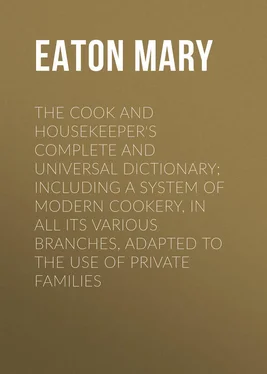DISTRESS FOR RENT. In these days of general complaint and general distress, when so many families and individuals are suffering from the extortions of tax-gatherers, and the severity of landlords, it is proper that householders and occupiers of land should be furnished with a little information on the subject of their legal rights and liabilities, in order to guard against injustice, or the fatal consequences of illegal proceedings. It must therefore be observed, that rent is recoverable by action of debt at common law; but the general remedy is distress, by taking the goods and chattels out of the possession of the tenant, to procure satisfaction for rent. A distress for rent therefore must be made for nonpayment, or rent in arrears, and cannot be made on the day in which the rent becomes due. Neither can distress be made after the rent has been tendered; or if it be tendered while the distress is making, the landlord must deliver up the distress. Any goods or effects that are damaged by the proceedings of the landlord, must be made good by him. – When distress is levied, it should be for the whole of the rent in arrears; not a part at one time and the remainder at another, if there was at first a sufficiency; but if the landlord should mistake the value of the things, he may make a second distress to supply the deficiency. He must be careful to demand neither more nor less than is due; he must also shew the certainty of the rent, and when it was due; otherwise the demand will not be good, nor can he obtain a remedy. – A landlord may distrain whatever he finds on the premises, whether it be the property of his tenant or not, except such things as are for the maintenance and benefit of trade; such as working tools and implements, sacks of corn, or meal in a mill. Neither fixtures in a house nor provisions can be distrained, nor any other article which cannot be restored in as good a state as when it was taken; but wearing apparel may be distrained when they are not in use. Money out of a bag cannot be distrained, because it cannot be known again; but money sealed up in a bag may. A horse in a cart cannot be distrained, without also taking the cart; and if a man be in the cart, these cannot be taken. A horse bringing goods to market, goods brought to market to be sold, goods for exportation on a wharf or in a warehouse, goods in the hands of a factor, goods delivered to a carrier to be conveyed for hire, wool in a neighbour's barn, are all considered as goods in the hands of a third person, and cannot therefore be distrained by a landlord for rent. But goods left at an inn or other place of conveyance, a chaise or horse standing in a stable, though the property of a third person, may be distrained for rent. A distress must not be made after dark, nor on the Sabbath day. – Where a landlord means to distrain for rent, it is not necessary to demand his rent first, unless the tenant is on the premises on the day of payment, and ready to pay it. But if goods are distrained, and no cause given for so doing, the owner may rescue them, if not impounded. Distraining part of the goods for rent in arrear, in the name of the whole goods, will be deemed a lawful seizure. But if distress and sale be made for rent when it can be proved that no rent is due or in arrear, the person so injured may recover double the value of such goods distrained, with full costs of suit. If goods be impounded, though they have been distrained without a cause, a tenant cannot touch them, because they are then in the hands of the law; but if not impounded or taken away, he is at liberty to rescue them. – If distress be made for rent, and the goods are not replevied within five days after the distress is made, and notice left on the premises stating the cause of such distress, the person distraining may have the goods appraised by two persons, sworn by the constable of the place for that purpose, and may after such appraisement sell them to the best advantage. The rent may then be taken, including all expences, and the overplus left in the hands of the constable for the owner's use. If a landlord commit an unlawful act or any other irregularity, in making distress for rent which is justly due, the distress itself will not on that account be deemed unlawful; but full damages may be demanded by the injured party, with full costs of suit; either in an action of trespass, or on the case. But if full recompense be tendered to the tenant for such trespass before the action is commenced, he is bound to accept it, or the action will be discharged. – If a tenant clandestinely remove his goods, to prevent the landlord from distraining them for rent, he may seize the goods within thirty days, wherever they shall be found; and if not actually sold previous to the seizure, he may dispose of them in order to recover his rent. Any tenant or assistant removing goods to prevent a distress, is liable to double the value of the goods, which the landlord may recover by action at law. If under the value of fifty pounds, complaint may be made in writing to two neighbouring magistrates, who will enforce the payment by distress, or commit the offenders to the house of correction for six months. If any person after the distress is made, shall presume to remove the goods distrained, or take them away from the person distraining, the party aggrieved may sue for the injury, and recover treble costs and damages against the offender. – A landlord may not break a lock, nor open a gate; but if the outer door of the house be open he may enter, and break open the inner doors. But where goods are fraudulently removed, and locked up to prevent their being seized, the landlord may break open every place where they are and seize them. If in a dwelling house, an oath must first be made before a magistrate, that is was suspected the goods were lodged there. The most eligible way is to remove the goods immediately, and to give the tenant notice where they are removed to; but it is usual to leave them under the protection of a person on the premises for five whole days, after which it is lawful to sell them. In making the distress, it is necessary to give the bailiff a written order for that purpose, which the landlord may do himself without any stamp, only specifying the person's name, place of abode, and rent in arrears for which the goods and chattels are to be seized. After this an inventory is to be made of the articles, a copy of which is to be given to the tenant, accompanied with a notice that unless the arrears of rent and charges of distress be paid, or the goods replevied at the expiration of five days from the day of distress, the said goods will be appraised and sold according to law. If the landlord chooses to indulge the tenant with a longer time to raise the money, a memorandum must be taken of the tenant, stating that possession is lengthened at his request, or the landlord will be liable to an action for exceeding the time of his original notice. – See Tenants.
DOUBLE RENT. If a tenant has received a written notice, and he refuse to quit, after such notice has been regularly served, and will not give possession at the time required, he is liable to pay at the rate of double the annual value of the land or tenement so detained, for so long time as the same are detained in his possession, and the payment may be recovered by action of debt. Or if the tenant shall give notice of his intention to quit the premises, and do not deliver up possession according to such notice, he is liable to the payment of double rent, as in the other case. – The following is the form of a notice to a tenant to quit, or to pay double rent. 'Mr. A. B. I hereby give you notice to deliver up possession and quit, on or before next Michaelmas day, the house and premises which you now hold of me, situate in the parish of in the county of and in default of your compliance therewith, I do and will insist on your paying me for the same, the yearly rent of being double the annual rent, for such time as you shall detain the key, and keep possession, over the said notice. Witness my hand this day of 182. C. D. Landlord of the said premises.
Читать дальше












![John Bruce - The Lettsomian Lectures on Diseases and Disorders of the Heart and Arteries in Middle and Advanced Life [1900-1901]](/books/749387/john-bruce-the-lettsomian-lectures-on-diseases-and-disorders-of-the-heart-and-arteries-in-middle-and-advanced-life-1900-1901-thumb.webp)